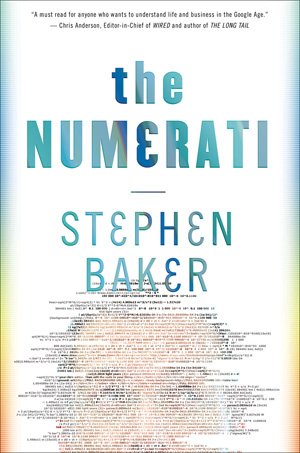 by: Marrie Stone
by: Marrie Stone
With every swipe of your savings card and click of your mouse, with each text message you send and phone call you receive, the flip of your remote, tick of your toll road transponder, and numerous other activities you do without thinking, you’re producing mounds of information about yourself. In fact, each person produces an average of 2,500 pieces of data each month. As you may already suspect, someone is not only collecting this information, but they’re analyzing your moves in an effort to control your behavior. To some, this seems scary and invasive. To others, convenience outweighs privacy. In the future, data analysis could become our ruin, or it might just save our lives.
Stephen Baker, who has written for BusinessWeek for more than twenty years and is the coauthor of Blogspotting.net (voted by The New York Times as one of fifty blogs to watch), unearths the mysterious world of the “Numerati.” Who are they? How are they watching us? What are they doing with all the data they’ve collected? And how are we putting ourselves at risk of being further exposed?
Baker visits casinos, online dating services, and the NSA (National Security Agency), to name just a few of the organizations already utilizing the numerati. He analyzes how we work and whom we love. From health care to the war on terror, from how we shop to how we vote, Baker provides an eye-opening examination of how our data crumbs are being directed back at us.
While it’s difficult for this new math intelligentsia to predict how any particular individual may react to a given situation, they can predict, with stunning accuracy, how groups will behave in general. If the analysts are right even a chunk of the time, they can make a significant impact. It’s the mathematical modeling of humanity, and it’s happening in almost every sector of our lives. For example, the type of pet you choose and the magazines you buy can reveal predictive information about the way you’ll likely vote: dog owners are more often Republicans; subscribers to gourmet food magazines generally vote Democrat.
It doesn’t stop there. Internet dating services have found that the length of the ring finger in relation to the index finger may reveal hormone levels that were present in our fetal development, and may influence the types of mates we’ll choose. The connections grow more obtuse as one collects more data—for instance, why are romantic-movie lovers drawn to car rental ads on the Internet?
As with most progress, technology is advancing faster than we’re able to grapple with its implications. If limited surveillance leads to the capture of a known terrorist, extensive surveillance could yield more arrests. But this added security comes at what cost to our privacy?
In some cases, the Numerati are using their power as much for our benefit as for our exploitation. Internet dating services are enjoying enormous success. Health care is slowly being transformed. Imagine a sort of “smart house” hooked up with sensors and gadgets that can alert a doctor if your grandmother hasn’t come to the kitchen that day; if her weight has fluctuated to a worrisome level; or if her gait has changed ever-so-slightly.
In theory, the Numerati can help us live longer, more productive lives. In practice, though, they seem to be doing little more than targeting us for advertising and political campaigns. However, we must consider that time is like dog-years in the technology sector. Things change rapidly. The adage seems to be holding true, at least for the Numerati: if some information is good, then more must be better.
For those craving anonymity, we’re our own worst enemy. Not only are we collecting our own data, but we’re sending all that information off in bundled packages to the analysts hundreds of times each day. How they choose to use it, only time will tell.
Marrie Stone is the co-host of "Writers on Writing", with Barbara DeMarco-Barrett, broadcasting Wednesday mornings at 9:00 a.m. and available via podcast. She is a former corporate attorney. Her work has appeared in several publications including The Writer's Digest and The River Oak Review.
Share
|
|

